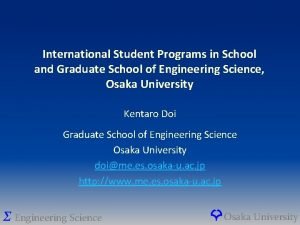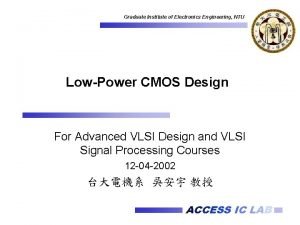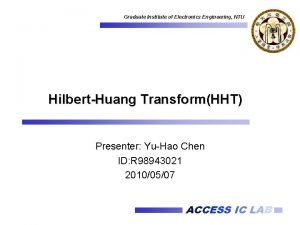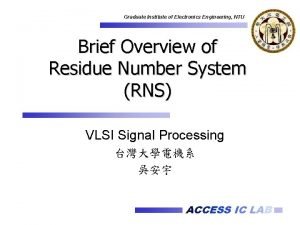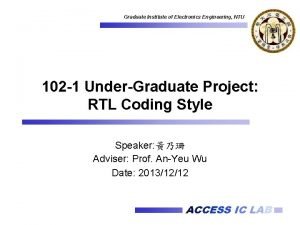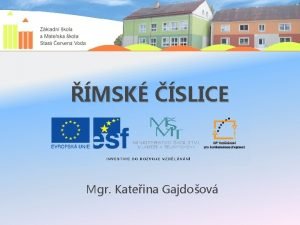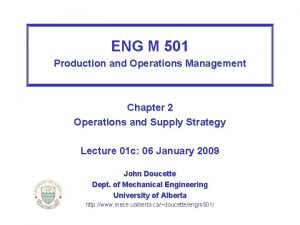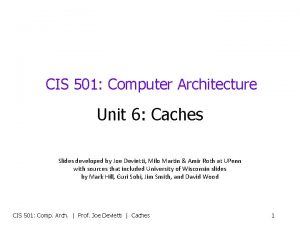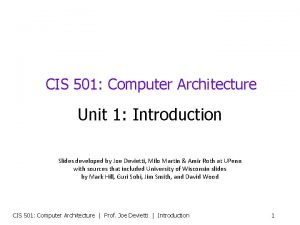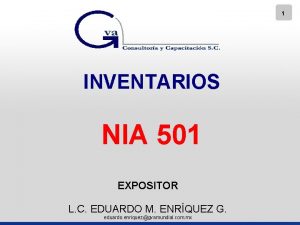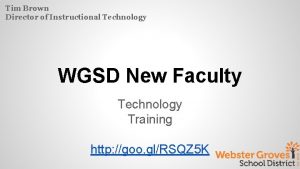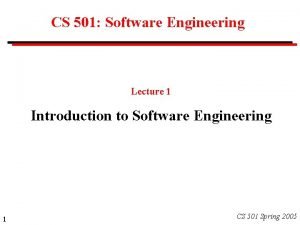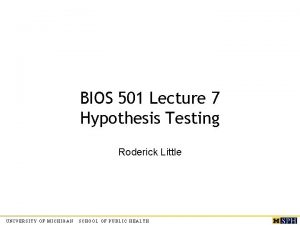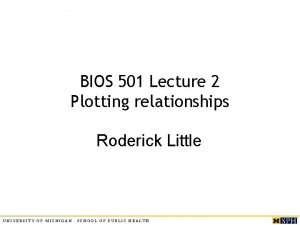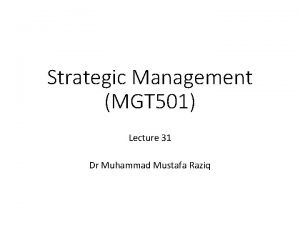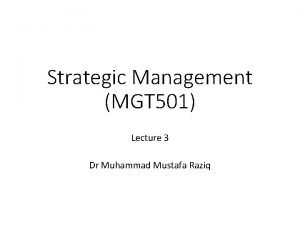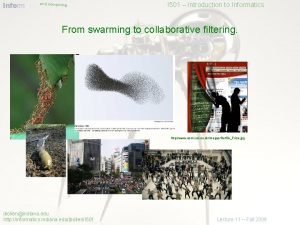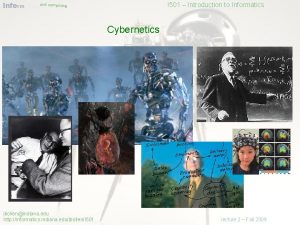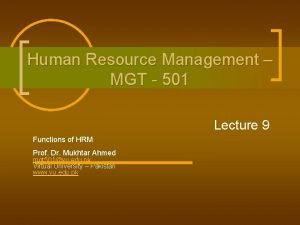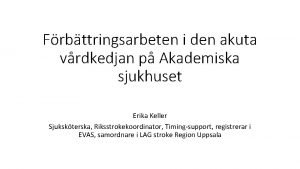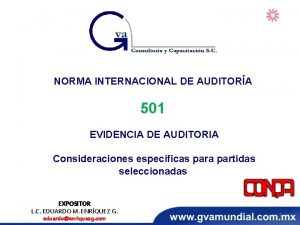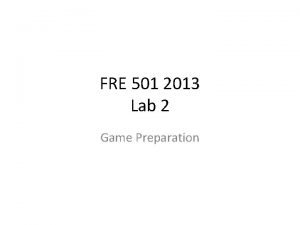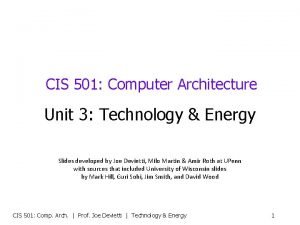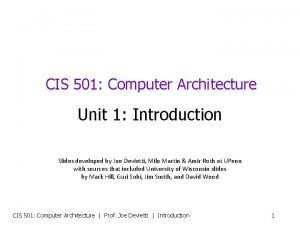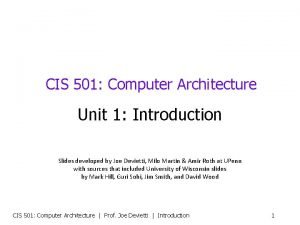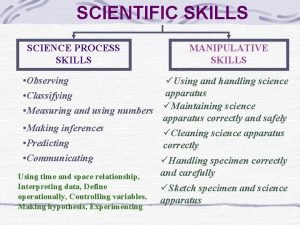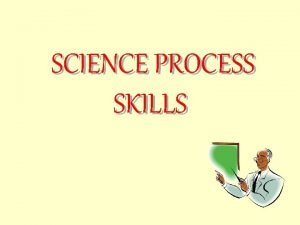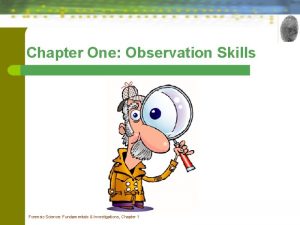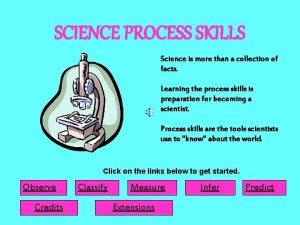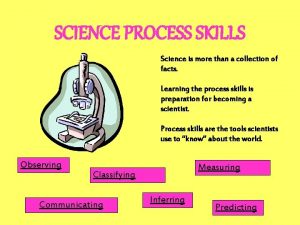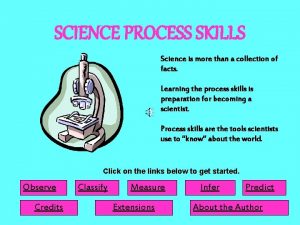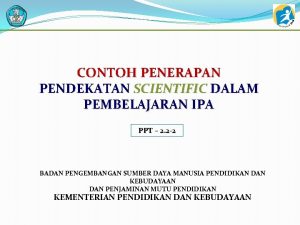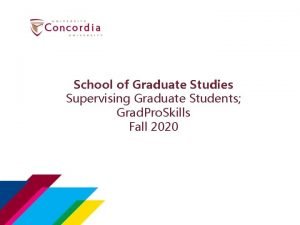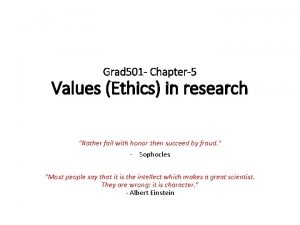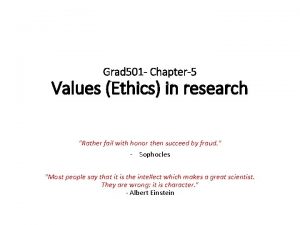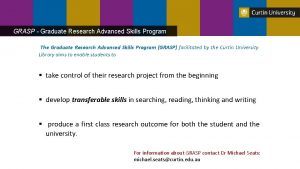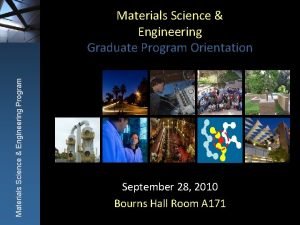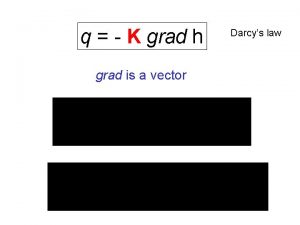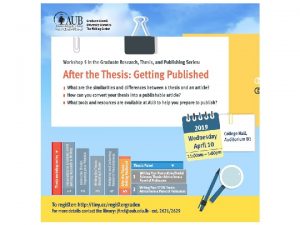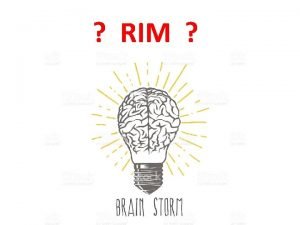Grad 501 Graduate Research Skills in Science Engineering































































- Slides: 63

Grad 501 Graduate Research Skills in Science & Engineering By Prof. Dr. Osman YILMAZ

Fundamental characteristics of science, technology and scientists: Scientific thinking skills Grad 501: Graduate Research Skills 2

§ a particular way of understanding the natural world. § a systematic process of seeking or producing knowledge. § it generally involves: * observation and problem definition * development of hypothesis, * continuous testing and extensive peer review * development of theories, laws or principles Grad 501: Graduate Research Skills 3

Main features of Science Grad 501: Graduate Research Skills 4

Main features of Science Grad 501: Graduate Research Skills Knowledge gained from studying one part of the universe is applicable to other parts. 5

* Science welcomes revision of its outcomes. * In principle, any theory can change after disproof attempts and new theories may replace the old ones. * Thus, science corrects itself. Main features of Science * Examples: * "quantum mechanics" replaced the "classical mechanics (Newton's Laws)" for studying the behavior of micro-particles * The number of satellites of the sun is continuously changing. Grad 501: Graduate Research Skills 6

Main features of science. Grad 501: Graduate Research Skills Although science welcomes change, it is not easy to change the scientific outcomes once produced by scientific standards. 7

*It has limits. Main features of science Grad 501: Graduate Research Skills 8

Science relies on verifiable, measurable, valid evidences, i. e. , accurate data, at every stage of scientific process. Main features of science. Grad 501: Graduate Research Skills Solid evidences can be gathered by measurements by and only by our senses, or the extensions of our senses (instruments). 9

Main features of science. Development of science and scientific knowledge are not affected by human factors, like prejudices, biases, hopeful or wishful thinking, personal beliefs or priorities or preferences, nationality, sex, ethnic origin, age, political convictions, moral and aesthetic judgments and choices or religion. You like it or not, water has a boiling point of 100. 0 °C every time, everywhere. Grad 501: Graduate Research Skills 10

Main features of science. Grad 501: Graduate Research Skills Logic and creativity shapes the data and analysis into scientific outcomes. 11

Main features of science. Grad 501: Graduate Research Skills 12

“the temperature of the universe was around 1 trillion °C during the big-bang. . ” !!!! How do we know this? Main features of science. By using the predictive power of existing theories Grad 501: Graduate Research Skills 13

- Science is a collection of various disciplines with their own sub-disciplines. - The boundaries between disciplines are not usually clear-cut. Main features of science. - Sub disciplines, or new disciplines emerge from these boundaries. (Cont’d) Grad 501: Graduate Research Skills 14

- Science is conducted in (Cont’d) - universities, - Industry - government. - Motivation for - Universities: production of Main features of science. - knowledge, i. e. , basic sciences with no immediate benefit. Industry: "applied science" for immediate benefit. - Governments motivate - universities for the advancement - Grad 501: Graduate Research Skills 15 of science, industry, for the advancement of country.

- Scientific decisions are based on evidence, not on the beliefs/preferences of the majority of people. Main features of science. - You can not vote for the number of hydrogen atoms in water. - This does not exclude the scientific discussions Grad 501: Graduate Research Skills 16

The nature of technology Grad 501: Graduate Research Skills 17

- Technology: "the application of scientific knowledge for practical purposes" The nature of technology. - It is: - as old as human history. - a powerful tool in the development of civilization. Grad 501: Graduate Research Skills 18

- It helps us to change our world; - "changes" may result with unexpected benefits as much as unexpected risks and costs. The nature of technology. some background is needed for wise use of technology Grad 501: Graduate Research Skills 19

- It gains inspiration, or take ideas from science. - It grew out of the accumulated practical knowledge (know-how). (master-apprenticeship) The nature of technology. - advanced technologies strongly depend on science Grad 501: Graduate Research Skills 20

- Engineers and scientists think and work similarly - Scientists make the world understandable whereas engineers make it manupulable. The nature of technology. Grad 501: Graduate Research Skills 21

- Scientists can not answer all questions, engineers can not design solutions to all problems. The nature of technology. Grad 501: Graduate Research Skills 22

The nature of technology. Grad 501: Graduate Research Skills 23 There always some limitations at - the production level, - or at the application level, - or at the social values level

- absolute constrains like physical laws, physical properties etc. - flexible constraints like economical, political, social, ecological, ethical limitations. . . The nature of technology. - Operation and maintenance costs considered at the design stage. Grad 501: Graduate Research Skills 24

The nature of technology. Grad 501: Graduate Research Skills Thus, the technology designs should be tested before the final production 25

Control requires: • feedback (from sensors or other sources of information) • logical comparisons of measured data to standards/instructions The nature of technology. • a means for activating changes Grad 501: Graduate Research Skills 26

- Today microprocessors are widely used as control units. - Rapid communication and rapid processing is essential for complex control systems. The nature of technology. - All control systems require human control at some point. Grad 501: Graduate Research Skills 27

- Every design may have unintended side effects. - They may be beneficial or harmful. - Small technologies' side effects may have significant cumulative effects. - Prediction of side effects is difficult. Systematic risk analysis is needed. - Risk analysis is complicated and expensive. The nature of technology. Grad 501: Graduate Research Skills 28

!!!!!! The nature of technology. Grad 501: Graduate Research Skills 29

Fundamental characteristics of scientists Grad 501: Graduate Research Skills 30

Fundamental characteristics of scientists Grad 501: Graduate Research Skills 31 - Scientists: men or women from all nations or ethnic backgrounds. - work in various institutions and organizations. - work alone, in small groups, or as members of large research teams - places of work include classrooms, offices, laboratories, and natural field settings from space to the bottom of the sea. - communicate & colaborate with each other or other segments of society through special communication tools.

- Strict ethical principles to keep the science on top of the most valuable human assets - Within this context they: - act responsibly, - they never deviate from accuracy (cheat) for the sake of no human benefit, Fundamental characteristics of scientists - represent collegiality in scientific interactions - are transparent in conflicts of interest or potential conflicts of interest - protect human subjects, animals and environment - adhere to mutual responsibilities Grad 501: Graduate Research Skills 32

- Scientists have an advisory role they lead the society itself, or leaders, or administrators of the society by: helping to differentiate between the "facts" and "opinions", or "true" and "false", or "possible/probable" and "impossible". Fundamental characteristics of scientists Caution: Thus, their opinions are treated/perceived as "truth" by ordinary citizens. Albert Einstein during a radio talk Grad 501: Graduate Research Skills 33

*Critical thinking : "correct thinking « *A critical thinker can: * can ask appropriate questions, * gather relevant information, * efficiently and creatively Fundamental characteristics of scientists sort through this information, * reason logically from this information, and * come to reliable and trustworthy conclusions. Grad 501: Graduate Research Skills 34

*A critical thinker can: * focus, identify and clarify problems and issues, and, Fundamental characteristics of scientists * try alternative ways or methods to solve them. Grad 501: Graduate Research Skills 35

- Thus: A critical thinker can achieve a productive, successful, ethical, happy, and, ultimately, a satisfying and fulfilling life or profession. Fundamental characteristics of scientists - Critical thinking is a «must» for scientists & researchers (no alternative) Grad 501: Graduate Research Skills 36

- Critical Thinking welcomes thinkin styles like: - rational (logical) thinking, - empirical thinking, - skeptical thinking, - pragmatic thinking, - reflective thinking, - creative thinking, - comprehensible thinking, - reasonable thinking, - quantitative thinking, - analytical thinking, - statistical thinking. Fundamental characteristics of scientists Grad 501: Graduate Research Skills 37

- Critical thinking rejects thinking styles like: - illogical thinking, - intuitive thinking, - hopeful/wishful thinking, - Authoritarian thinking, - dogmatic thinking, - idealistic thinking, - absolutist thinking, - close-minded thinking, - mystical thinking, - emotional thinking, - qualitative thinking etc. Fundamental characteristics of scientists Grad 501: Graduate Research Skills 38

- Critical thinking could be learned from: Fundamental characteristics of scientists Grad 501: Graduate Research Skills 39 - Parents & teachers in childhood - Sciense & math courses in undergraduate education - continuous and conscious testing and evaluating your scientific practices and keeping them within the standards described here

- The most basic characteristics of critical thinking: Fundamental characteristics of scientists Grad 501: Graduate Research Skills - Empirical Thinking - Logical Thinking - Skeptical thinking 40

- Empirical Thinking, or Empiricism : The use of empirical (experimental) evidence to make vital decisions and reach sound conclusions Fundamental characteristics of scientists Grad 501: Graduate Research Skills 41

- Logical Thinking, or Rationalism: The Practice of Logical Reasoning Fundamental characteristics of scientists - Logic allows us to reason correctly. - Logic can be learned through education - The use of logic is not easy. Grad 501: Graduate Research Skills 42

- Logical logical fallacies: false logic, falsehood and misconceptions - Incorrect assumption of cause/effect relationship - Inaccurate or distorted use of Fundamental characteristics of scientists Grad 501: Graduate Research Skills 43 the interpretation of numerical statistical information - Faulty analogy, comparison carried too far, or comparison of things that have nothing in common - Stereotyping - Ignoring the question, digression, obfuscation to avoid answering a question - Faulty generalization

- Skeptical thinking, or skepticism: Possessing a skeptical attitude - repeatedly and rigorously Fundamental characteristics of scientists examining (questioning) our beliefs and conclusions in order not to be trapped by self deception or deception by others. Grad 501: Graduate Research Skills 44

- Learning and teaching: key concepts in the life of a scientist. - scientists update themselves by following literature Fundamental characteristics of scientists - Scientists share their knowledge with their - students, - colleagues, - and society whenever necessary. Grad 501: Graduate Research Skills 45

Tools: Fundamental characteristics of scientists Grad 501: Graduate Research Skills 46 - scientific seminars, conferences, and workshops - Thausands of scientific journals. . . - Peer reviewing - formal or informal discussions: - guard for unforseen mistakes - fueling effect for synergy , new ideas & critical thinking

Discussions: Not: fight or manifestation of power, Fundamental characteristics of scientists but: a winwin process. https: //www. jmr-outsourcing. dk Grad 501: Graduate Research Skills Aim: learning from each other 47

- carefully designed procedures or road maps are necessary - no invention is all of a sudden in science Fundamental characteristics of scientists Grad 501: Graduate Research Skills 48

- They may repeat the measurements several times - Steps may be tough, boring or not pleasant Fundamental characteristics of scientists Grad 501: Graduate Research Skills 49

Fundamental characteristics of scientists Grad 501: Graduate Research Skills 50 Close attention / focus on the details of the data is a must in science

- Originality: Diging the universe for exploring "unknown" or "new" or "unique", Fundamental characteristics of scientists - Originality in: - tools, - techniques, - procedures developed, - products - the use of data - etc. , Grad 501: Graduate Research Skills 51

Fundamental characteristics of scientists Grad 501: Graduate Research Skills 52 - Scientists see the universe through questions (curiosity) - A positive attitude is a must for productivity and effectiveness.

Creativity: - inceases the productivity and efficiency of problem solving Fundamental characteristics of scientists - useful when new ideas are needed - encourages looking from a broader perspective - can be improved. Grad 501: Graduate Research Skills 53

Creativity Inhibitors: (factors that limit the use of creative ability) - attitudes "I am not creative" or "I cannot improve my creative ability « Fundamental characteristics of scientists - Fear of - Grad 501: Graduate Research Skills 54 questioning, exploring new ideas, making mistakes, experiencing failure, taking risks (lack of self-confidence)

Creativity Inhibitors: Myths like: - One's creative ability is set at birth and it cannot be developed!!!! Fundamental characteristics of scientists IT CAN BE LEARNED - some people have creativity and others do not !!!!! ALL CREATIVITY STUDIES SUGGEST OTHERWISE Grad 501: Graduate Research Skills 55

Creativity Inhibitors: Myths like: - One's creative ability is set at birth and it cannot be developed!!!! Fundamental characteristics of scientists IT CAN BE LEARNED - some people have creativity and others do not !!!!! ALL CREATIVITY STUDIES SUGGEST OTHERWISE Grad 501: Graduate Research Skills 56

Creativity Stimulators: Improve any of your Fundamental characteristics of scientists - intellect, - life experiences - attitude toward creative problem solving - curiosity, - willingness to persevere, - knowledge of and ability to use creativity stimulators, i. e. , creative problemsolving methods Grad 501: Graduate Research Skills 57

Creativity Stimulators: - Talking things over - Keeping an open mind - Brainstorming - Negative brainstorming - Viewing the problem from Fundamental characteristics of scientists Grad 501: Graduate Research Skills imaginative perspectives - Concentrating on anomalies - Focusing on byproducts - Interrogating (collecting evidence through questioning) imaginary experts - Viewing the problem from the perspective of another discipline - Using 'the solution looking for the problem': serendipity - Using mind maps 58

Fundamental characteristics of scientists Grad 501: Graduate Research Skills 59 - Scientists appreciate beauty, i. e. , they are usually very close to art and artists. - This explains why most of the universities teach arts and science topics in a single faculty named "Faculty of Arts and Sciences"

This is not a shame. Science is still developing and will continue to develop as long as human curiosity exists. Fundamental characteristics of scientists Grad 501: Graduate Research Skills 60

Fundamental characteristics of scientists Grad 501: Graduate Research Skills 61 - True scientists also have all human feelings as much as ordinary citizens do. . . - They can also fail in in their decisions, even in their academic life. - They also love, hate, enjoy, get angry, scream, joke, belive, suffer, win, gain, loose, struggle, vote etc as much as ordinary citizens do. .

Fundamental characteristics of scientists - Surely You're Joking, Mr. Feynman!: Adventures of a Curious Character https: //youtu. be/HKTSaez. B 4 p 8 (Richard Feynman playing bongos) Grad 501: Graduate Research Skills 62

Fundamental characteristics of scientists Prof. Dr. Richard Feynman, 1965 Noble Prize winner RESEARCH That is what the rest of this lecture all about: Grad 501: Graduate Research Skills 63
 Oussep
Oussep Grad pro skills concordia
Grad pro skills concordia Graduate institute of electronics engineering
Graduate institute of electronics engineering 吳安宇
吳安宇 Graduate institute of electronics engineering
Graduate institute of electronics engineering Graduate institute of electronics engineering
Graduate institute of electronics engineering Graduate institute of electronics engineering
Graduate institute of electronics engineering What is your favourite subject
What is your favourite subject Tao onderwijs
Tao onderwijs Rimskych 501
Rimskych 501 Bds 501
Bds 501 Hino 501
Hino 501 Eng 501
Eng 501 Ariane 5 flight 501
Ariane 5 flight 501 Dev 501
Dev 501 Cis 501
Cis 501 Cis 501
Cis 501 Cis 501
Cis 501 Cis 501
Cis 501 Cisco pix 500
Cisco pix 500 Valuacion de inventarios
Valuacion de inventarios Wgsd clever
Wgsd clever Sempre vencendo mui vitorioso
Sempre vencendo mui vitorioso Cs-501
Cs-501 Bios 501
Bios 501 Bios 501
Bios 501 Mgt 501
Mgt 501 Mgt 501
Mgt 501 Top 500 inventory
Top 500 inventory I 501
I 501 I 501
I 501 Mgt501 human resource management
Mgt501 human resource management Turnus 501
Turnus 501 Simple capm
Simple capm 501
501 Norma 501
Norma 501 Opwekking 501
Opwekking 501 W 501
W 501 Cration
Cration Fre 501
Fre 501 Cis 501
Cis 501 Cis 501
Cis 501 Cis 501
Cis 501 Joe devietti
Joe devietti Intrapersonal and interpersonal communication
Intrapersonal and interpersonal communication Soft skills meaning
Soft skills meaning Ontario skills passport essential skills
Ontario skills passport essential skills What are science process skills
What are science process skills Science process skills definition
Science process skills definition Science skills olympics
Science skills olympics What is an observation in science
What is an observation in science Science process skills predicting
Science process skills predicting Communicating science process skills
Communicating science process skills Science process skills predicting
Science process skills predicting Pendekatan dalam pembelajaran ipa sd ppt
Pendekatan dalam pembelajaran ipa sd ppt Zagreb grb
Zagreb grb Anhalterdaumen
Anhalterdaumen Root word grad
Root word grad Vukovar grad heroj
Vukovar grad heroj Talijan veliko ili malo slovo
Talijan veliko ili malo slovo Gvinejsko prase
Gvinejsko prase Carcinom urotelial papilar grad 2
Carcinom urotelial papilar grad 2 Karlo rosi
Karlo rosi Deg rad grad kalkulator
Deg rad grad kalkulator
